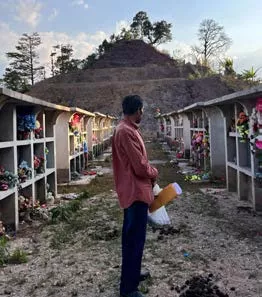
at the relocated ancestral cemetery that the
mining company Aura Minerals destroyed.
Photo credit: Minnesota Center for
Environmental Advocacy
Jenna Yeakle
Last February, staff from Sierra Club, Minnesota Center for Environmental Advocacy, and Honor the Earth traveled to Honduras to join Witness for Peace Solidarity Collective, a Midwest-based organization committed to peace, justice, and sustainable economies in the Americas. Because of my role in water protection and clean energy advocacy, I was invited to join the trip to learn from urban and rural communities. During the first part of the trip, we visited:
- A cooperative farming community in the Aguan Valley whose water source, the Guapinol River, is polluted by Los Pinares, an upstream mining facility located in a national park.
- The Garifuna coastal community of Triunfo de la Cruz, an Afro-Indigenous people whose livelihoods and culture are deeply tied to the coast, where they hold treaty rights. Their ancestral lands are increasingly privatized for the sake of tourism.
- The rural mountain town of Azacualpa, whose homes and families were displaced by MINOSA, a subsidiary of the U.S.-based mining company Aura Minerals, to extract gold deposits. The company’s gold mine also destroyed ancestral burial grounds and contaminated the mountain’s water sources.
Each community has endured acts of state violence – unregulated pollution, surveillance, criminalization, forced evictions, abductions and disappearances, and murder – with no consequences for the perpetrators.
The second half of the trip was filled with meetings with government officials, some of whom are sympathetic to human rights defense and environmental justice, and some of whom benefit from the violence perpetrated upon Honduran communities.
Here in northern Minnesota our communities experience our own challenges to protect the social, economic, and environmental integrity of our home against multinational corporate greed and the government agencies and officials who are beholden to them. From the criminalization of hundreds of Stop Line 3 protesters to the Minnesota Pollution Control Agency’s faulty decision to grant PolyMet a permit when the EPA had expressed concerns about the project, Minnesotans have reason to call for stronger accountability of our state agencies, whose purpose is to protect the public.
This is what the Sierra Club is striving for in our Polluter Capture campaign.
From Honduras to Minnesota, it is imperative that we uphold Indigenous treaty rights, account for the full impacts of industry projects, put people above profits, and work towards a future where all have what they need.
Jenna Yeakle is a Sierra Club community organizer based in Duluth. She applies her community organizing experience, public health expertise and passion for social justice to building the movement for a just transition to clean, equitable energy in the Northland.